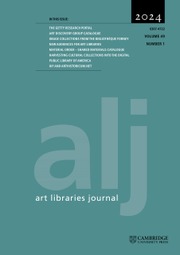No CrossRef data available.
Article contents
Indigenous languages in the British Library catalogue: a critique of ‘Indians of North America—Languages’
Published online by Cambridge University Press: 12 April 2023
Abstract
The British Library holds a significant collection of printed materials in, and about, North American Indigenous languages that largely speaks to a history of colonial and settler-colonial projects and collecting. This article suggests one way of exploring what that collecting context means for how we find, experience and encounter language texts in the library. It offers an approach to ‘reading’ catalogues that puts texts in conversation with cataloguing systems to both contextualise and challenge the legacies of collecting in knowledge organisation today. It traces a brief history of the Library of Congress Subject Heading (LCSH), ‘Indians of North America—Languages’, a term that reoccurs in the British Library's catalogue. This history shows how parts of the catalogue are artefacts of problematic bodies of knowledge, whilst also surfacing examples of Indigenous resistance that can be used to reframe the catalogue.
- Type
- Research Article
- Information
- Copyright
- Copyright © The Author(s), 2023. Published by Cambridge University Press on behalf of ARLIS
References
1. Given the scope and space of this article, I use the term ‘Indigenous’ to refer generally to the peoples and languages of the area now called North America in awareness of the specific and diverse languages, knowledges and cultures this term encompasses.
2. Issues with LCSH have been researched since Sanford Berman, Prejudices and Antipathies: A Tract on the LC Subject Heads Concerning People (Metuchen, N.J: Scarecrow Press, 1971) and generally by Olson, H. A. “Difference, culture and change: The untapped potential of LCSH,” Cataloging & Classification Quarterly 29, no. 1-2 (2001): 53-71CrossRefGoogle Scholar and “The Power to Name: Representation in Library Catalogs,” Signs 26 no. 3 (2001): 639-668. For critiques on LCSH for Indigenous topics see M. Q. Dudley, “A library matter of genocide: The Library of Congress and the historiography of the Native American Holocaust,” 8, no. 2 (2017) and Lee, D., “Indigenous Knowledge Organization: A Study of Concepts, Terminology, Structure and (Mostly) Indigenous Voices,” Partnership: The Canadian Journal of Library and Information Practice and Research 6, no. 1 (2011)CrossRefGoogle Scholar
3. Dupont, Sarah. “One Decolonizing Change to Subject Headings at UBC Library.” https://xwi7xwa.library.ubc.ca/. June 25, 2020
4. Projects such as The Manitoba Archival Information Network (MAIN) project provides a list of alternative LCSHs see Bone, Christine and Lougheed, Brett, “Library of Congress Subject Headings Related to Indigenous Peoples: Changing LCSH for Use in a Canadian Archival Context,” Cataloging & Classification Quarterly 56, no. 1 (2018): 83-95CrossRefGoogle Scholar. Others embed Indigenous ontologies in library organisation, see Duarte, Marisa Elena & Belarde-Lewis, Miranda, “Imagining: Creating Spaces for Indigenous Ontologies,” Cataloging & Classification Quarterly 53, no. 5-6 (2015): 677CrossRefGoogle Scholar. Littletree, Sandra and Metoyer, Cheryl A., “Knowledge Organization from an Indigenous Perspective: The Mashantucket Pequot Thesaurus of American Indian Terminology Project,” Cataloging & Classification Quarterly 53, no. 5-6 (2015): 640-657CrossRefGoogle Scholar, Doyle, A. M., Lawson, K., and Dupont, S., “Indigenization of knowledge organization at the Xwi7wa library,” Journal of Library and Information Studies 13, no.2 (2015): 107-134Google Scholar
5. Doyle, A. M., Lawson, K., and Dupont, S., “Indigenization of knowledge organization at the Xwi7wa library,” Journal of Library and Information Studies 13, no.2 (2015): 107-134Google Scholar
6. “Introduction: MARC Code List for Languages,” The Library of Congress last modified October, 2007, https://www.loc.gov/marc/languages/introduction.pdf Some projects have focused on implementing different language codes for greater specificity. See Kleiber, E., Berez-Kroeker, A. L., Chopey, M., Yarbrough, D., and Shelby, R., 2018. “Making Pacific Languages Discoverable: A Project to Catalog the University of Hawai‘i at Mānoa Library Pacific Collection by Indigenous Languages,”, The Contemporary Pacific 30, no. 1 (2018): 109–122CrossRefGoogle Scholar and “About AustLang,” Australian Institute of Aboriginal and Torres Strait Islander Studies, https://collection.aiatsis.gov.au/austlang/about
7. Adler, Melissa, Cruising the Library: Perversities in the Organization of Knowledge (Fordham University Press, 2017): 2Google Scholar
8. Ibid
9. Adler, Melissa, “Afterword: The Strangeness of Subject Cataloging,” Library Trends 68, no. 3 (2020) 549-556: 551CrossRefGoogle Scholar
10. Lee, Tamara, Bullard, Julia and Dupont, Sarah, “Comparing the Cataloguing of Indigenous Scholarships: First Steps and Findings,” Proceedings from North American Symposium on Knowledge Organization 8, (2021): 6Google Scholar.
11. Lisa Brooks, The Common Pot: The Recovery of Native Space in the Northeast (University of Minnesota Press: Minneapolis, 2008): xxxv
12. Ibid
13. James Gilreath and Douglas L. Wilson ed., “Thomas Jefferson's Library: A Catalog with the Entries in His Own Order”, Library of Congress, 1989, https://catdir.loc.gov/catdir/toc/becites/main/jefferson/88607928.html.
14. Similar examples of resistance can be found in later collecting projects. Kelly Wisecup surfaces Cherokee John Ridge's response to Albert Gallatin's wordlist in “Entangled Archives: Cherokee Interventions in Language Collecting,” in Afterlives of Indigenous Archives, ed. Ivy Schweitzer and Gordon Henry Jr (Dartmouth College: Dartmouth Digital Commons, 2019), 120-138. For resistance and use of Jefferson's wordlists today see Sarah Rivett, “Unruly Empiricisms and Linguistic Sovereignty in Thomas Jefferson's Indian Vocabulary Project,” American Literature 87, no. 4 (December 2015): 645-680
15. Library of Congress, Subject headings used in the dictionary catalogues of the Library of Congress, (Washington DC: U.S. Govt. Print. Office, 1919): 565
16. J. W. Powell, First Annual Report of the Bureau of Ethnology to the Secretary of the Smithsonian Institution 1879-1880 (Washington: Government Printing Office, 1881): xv
17. Many of the completed copies of Powell's Introduction to the Study of Indian Languages can be found at the National Anthropological Archives, Smithsonian Institution in Washington D.C. The blanks at the beginning of each workbook inform the card catalogue attached to that manuscript.
18. British Museum, Subject Index of Modern Works Added to the British Museum in the Years 1880–1885 (London: British Museum, 1886)
19. British Museum, Subject Index of Modern Works Added to the British Museum in the Years 1961–1970 (London: British Museum, 1982)




